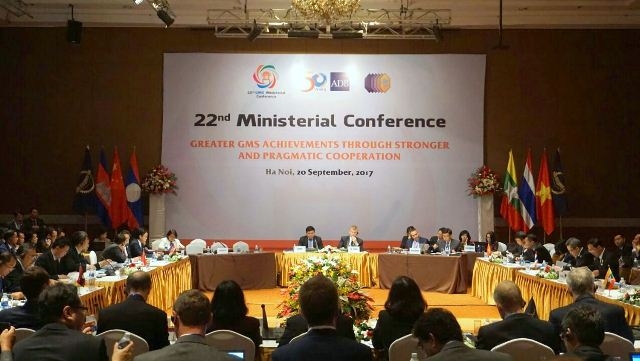Mekong ministers endorse US$64 billion project towards sustainable regional development
The endorsement of the GMS Regional Investment Framework 2022 is part of activities under the 22nd GMS Ministerial Conference which opened in Hanoi, on September 20, to celebrate 25 years of GSM economic cooperation, in addition to acknowledging the achievements of a programme that has created a strong bond of openness, mutual trust and shared commitment.
Six regional countries, including Cambodia, China (specifically Yunnan province and Guangxi Zhuang autonomous region), Laos, Myanmar, Thailand, and Vietnam, joined the programme in 1992, with assistance provided by the Asian Development Bank (ADB), to enhance their economic relations. Under the programme, investment projects worth more than US$19.1 billion have been undertaken so far.
 |
Speaking at the opening ceremony, Vietnamese Minister of Planning and Investment Nguyen Chi Dung affirmed that the GMS Economic Cooperation Programme is the most prominent and successful initiative among the regional cooperation and integration initiatives. Since its inception, the GMS programme has grown exponentially, including projects and collaborative activities in most socio-economic fields of the GMS countries.
The programme has achieved many encouraging achievements across various areas of cooperation, contributing to creating a deep and broad connection among the nations, through projects to connect transport infrastructure, electricity, tourism, agricultural development, environmental protection and human resource development, while strengthening community connections and greatly enhancing the competitiveness of the sub-region.
Vietnam pledged its strong support for the GMS economic cooperation initiative, Minister Dung said, adding that at present, the country is actively mobilising capital from bilateral and multilateral international organisations in order to implement high-priority projects that Vietnam participates in by integrating GMS priority programmes and projects into those funded by foreign donors.
It will continue to work closely with the GMS countries, the ADB and other development partners, including the private sector, to implement the objectives set out in the GMS economic programme, affirmed Dung.
At the meeting, the ministers welcomed the preparation of the Hanoi Action Plan (HAP) 2018-2022, which calls for an expansion of economic corridors in order to boost the connectivity between countries, as well as within rural and urban centers, to ensure a more equitable distribution of the benefits of economic growth.
They also endorsed the GMS Regional Investment Framework 2022 to support the HAP through a pipeline of 222 investment and technical assistance projects valued at US$64 billion. The ministers urged for greater engagement by development partners and the private sector to meet financing requirements in the GMS.
The ministers extended their strong support for a new GMS Transport Sector Strategy that aims to build a seamless, efficient, reliable, and sustainable GMS transportation system. This will be achieved through the improvement of the sub-region’s links with South Asia and other parts of Southeast Asia, better cross-border transport, strengthened intermodal transport links and logistics development, in addition to enhanced road safety.
The GMS Tourism Sector Strategy 2016-2025 was also endorsed with the aim of enabling a more competitive, balanced, and sustainable destination development. The ministers welcomed the progress towards the formal establishment of the Mekong Tourism Coordinating Office as an intergovernmental organisation.
In agriculture, they welcomed the endorsement by the Second GMS Agriculture Ministers’ Meeting of a strategy to promote safe and environment-friendly agriculture products, and a plan to strengthen value chain integration involving smallholder farmers and rural women, as well as small and medium-sized agro-enterprises.

